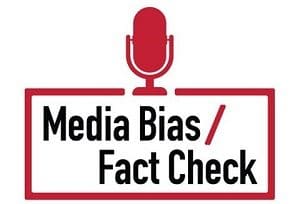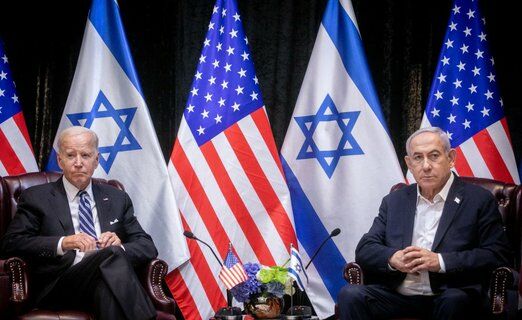
- April 11, 2024 | The Latest Fact Checks curated by Media Bias Fact Check 04/11/2024
- April 11, 2024 | Daily Source Bias Check: Lowy Institute
- April 10, 2024 | The Latest Fact Checks curated by Media Bias Fact Check 04/10/2024
- April 10, 2024 | Daily Source Bias Check: Center for Union Facts
- April 9, 2024 | The Latest Fact Checks curated by Media Bias Fact Check 04/09/2024

Foreign Policy Research Institute – Bias and Credibility
Right-center bias.
These media sources are slightly to moderately conservative in bias. They often publish factual information that utilizes loaded words (wording that attempts to influence an audience by appealing to emotion or stereotypes) to favor conservative causes. These sources are generally trustworthy for information but may require further investigation. See all Right-Center sources.
- Overall, we rate FPRI Right-Center Biased based on editorial positions and High for factual reporting due to strong sourcing and a clean fact check record.
Detailed Report
Bias Rating: RIGHT-CENTER Factual Reporting: HIGH Country: USA Press Freedom Rank: MOSTLY FREE Media Type: Organization/Foundation Traffic/Popularity: Medium Traffic MBFC Credibility Rating: HIGH CREDIBILITY
Founded in 1955, The Foreign Policy Research Institute (FPRI) is an American think tank based in Philadelphia, Pennsylvania. The Institute researches geopolitics, international relations, and international security in the various regions of the world and ethnic conflict, U.S. national security, terrorism, and think tanks themselves. According to their mission , “The Foreign Policy Research Institute is dedicated to producing the highest quality scholarship and nonpartisan policy analysis focused on crucial foreign policy and national security challenges facing the United States. We educate those who make and influence policy, as well as the public at large, through the lens of history, geography, and culture.”
Read our profile on the United States government and media.
Funded by / Ownership
Donations fund FPRI. The website does not clearly state who their large donors are. They do provide a link to the board of trustees, which reveals a lack of diversity .
Analysis / Bias
In review, the FPRI reports news and research with minimal bias, such as this: Chinese State Media on Coronavirus and President Trump . News and information are always properly sourced from credible media outlets. Editorially, they support a firm foreign policy that aligns with the right, such as holding concern over China’s increased power Biden’s take on China . The think tank also demonstrates concern for terrorism with a deep analysis of the threats that are highly sourced and factual. Finally, when it comes to science, they promote the consensus with both climate change and covid-19 . In general, they report news and information factually with a right-leaning editorial bias.
Failed Fact Checks
- None in the Last 5 years
Overall, we rate FPRI Right-Center Biased based on editorial positions and High for factual reporting due to strong sourcing and a clean fact-check record. (7/14/2016) Updated (D. Van Zandt 10/28/2022)
Source: https://www.fpri.org/
Last Updated on May 24, 2023 by Media Bias Fact Check
Do you appreciate our work? Please consider one of the following ways to sustain us.
MBFC Ad-Free
MBFC Donation
Left vs. Right Bias: How we rate the bias of media sources
Explore Similar Sources:
- Manhattan Institute for Policy Research – Bias and Credibility
- Institute for Women’s Policy Research (IWPR) – Bias and Credibility
- Foreign Policy Initiative – Bias and Credibility
- Foreign Policy in Focus – Bias and Credibility
- Foreign Policy Journal – Bias and Credibility
Support our mission - ad-free browsing & exclusive content. If you value our work, consider becoming a member.
New membership plans available.
Every contribution counts
Never see this message again

- Ideas & Resources
- Community & Events
A monthly round up of the latest content and activities from OTT and our global community.
Read our privacy policy
- Explore the Directory
- Add your think tank
- Access full dataset
- Global statistics
Foreign Policy Research Institute
The Foreign Policy Research Institute is dedicated to bringing the insights of scholarship to bear on the foreign policy and national security challenges facing the United States. It seeks to educate the public, teach teachers, train students, and offer ideas to advance U.S. national interests based on a nonpartisan, geopolitical perspective that illuminates contemporary international affairs through the lens of history, geography, and culture.
Contact details
Areas of focus, organisation details, organisational performance.
This database is run by On Think Tanks. You can contact us on [email protected] if you have any questions or queries.
Rethink Priorities
RP United States
The Africa Center for Strategic Progress
United States
East Asia Policy Institute
EAPI United States
Foreign Policy Research Institute
Share organization
Or copy link:
Add to list
You have no lists yet
Create your first list:
1 ? 's' : ''}`" >
If your institution is a member, please log into Policy Commons from a link provided by your institution. This typically involves logging in via a menu managed by your library.
Collections
Publications, could togo’s new constitution jeopardize its stability, the visegrád four: from troubled to broken, us withdrawal from niger signals a shift in western influence in the sahel, havana syndrome: the history behind the mystery, the islamic state five years after the collapse of the caliphate.
29 Mar 2024
The Technological Pivot of History: Power in the Age of Exponential Innovation
28 Mar 2024
China's Local Policymakers' Strategic Adaptation to Political Centralization
27 Mar 2024

Russian Women in the Face of War Against Ukraine
26 Mar 2024
Crocus City Hall Concert Attack
25 Mar 2024
Orbis Editor's Corner: Facing Future Challenges
22 Mar 2024
Programs submenu
Regions submenu, topics submenu, chinese interference in taiwan's 2024 elections and lessons learned, the political pressure behind scotland on the ballot, senegal’s democracy: how did we get here and what shall we expect, commonhealth live with dr. julie gerberding and former senator richard burr.
- Abshire-Inamori Leadership Academy
- Aerospace Security Project
- Africa Program
- Americas Program
- Arleigh A. Burke Chair in Strategy
- Asia Maritime Transparency Initiative
- Asia Program
- Australia Chair
- Brzezinski Chair in Global Security and Geostrategy
- Brzezinski Institute on Geostrategy
- Chair in U.S.-India Policy Studies
- China Power Project
- Chinese Business and Economics
- Defending Democratic Institutions
- Defense-Industrial Initiatives Group
- Defense 360
- Defense Budget Analysis
- Diversity and Leadership in International Affairs Project
- Economics Program
- Emeritus Chair in Strategy
- Energy Security and Climate Change Program
- Europe, Russia, and Eurasia Program
- Freeman Chair in China Studies
- Futures Lab
- Geoeconomic Council of Advisers
- Global Food and Water Security Program
- Global Health Policy Center
- Hess Center for New Frontiers
- Human Rights Initiative
- Humanitarian Agenda
- Intelligence, National Security, and Technology Program
- International Security Program
- Japan Chair
- Kissinger Chair
- Korea Chair
- Langone Chair in American Leadership
- Middle East Program
- Missile Defense Project
- Project on Fragility and Mobility
- Project on Nuclear Issues
- Project on Prosperity and Development
- Project on Trade and Technology
- Renewing American Innovation Project
- Scholl Chair in International Business
- Smart Women, Smart Power
- Southeast Asia Program
- Stephenson Ocean Security Project
- Strategic Technologies Program
- Transnational Threats Project
- Wadhwani Center for AI and Advanced Technologies
- All Regions
- Australia, New Zealand & Pacific
- Middle East
- Russia and Eurasia
- American Innovation
- Civic Education
- Climate Change
- Cybersecurity
- Defense Budget and Acquisition
- Defense and Security
- Energy and Sustainability
- Food Security
- Gender and International Security
- Geopolitics
- Global Health
- Human Rights
- Humanitarian Assistance
- Intelligence
- International Development
- Maritime Issues and Oceans
- Missile Defense
- Nuclear Issues
- Transnational Threats
- Water Security
- Leadership & Staff
- Financial Information
- Membership Groups
- Congressional Affairs
- Careers & Culture
The Center for Strategic and International Studies (CSIS) is a bipartisan, nonprofit policy research organization dedicated to advancing practical ideas to address the world’s greatest challenges.
Thomas J. Pritzker was named chairman of the CSIS Board of Trustees in 2015, succeeding former U.S. senator Sam Nunn (D-GA). Founded in 1962, CSIS is led by John J. Hamre, who has served as president and chief executive officer since 2000.
CSIS’s purpose is to define the future of national security. We are guided by a distinct set of values—non-partisanship, independent thought, innovative thinking, cross-disciplinary scholarship, integrity and professionalism, and talent development. CSIS’s values work in concert toward the goal of making real-world impact.
CSIS scholars bring their policy expertise, judgment, and robust networks to their research, analysis, and recommendations. We organize conferences, publish, lecture, and make media appearances that aim to increase the knowledge, awareness, and salience of policy issues with relevant stakeholders and the interested public.
CSIS has impact when our research helps to inform the decisionmaking of key policymakers and the thinking of key influencers. We work toward a vision of a safer and more prosperous world.
At the height of the Cold War in 1962, Admiral Arleigh Burke and David Abshire founded the Center for Strategic and International Studies at Georgetown University in Washington, DC. The institution was dedicated to the simple but urgent goal of finding ways for the United States to survive as a nation and prosper as a people.
Since its founding, CSIS has been at the forefront of solutions to the vexing foreign policy and national security problems of the day. In 1966, CSIS research triggered House hearings on the watershed Sino-Soviet split. In 1978, CSIS convened the first public hearing on Capitol Hill on the Cambodian genocide, sparking major changes in congressional and executive branch perceptions of the tragedy.
In 1985, a CSIS panel led to the Goldwater-Nichols legislation to reform the Defense Department and Joint Chiefs of Staff. In 1998, it was a report from a CSIS retirement commission that became the bipartisan benchmark of the Social Security reform debate. In 2007, the CSIS Smart Power Commission provided a diagnosis of America’s declining standing in the world and offered a set of recommendations for a smart power approach to America’s global engagement. These are but a few of the highlights.
Today, CSIS is one of the world’s preeminent public policy institutions on foreign policy and national security issues. The Center’s over 250 full-time staff and large network of affiliated scholars conduct research and analysis and develop policy initiatives that look to the future and anticipate change. CSIS is regularly called upon by Congress, the executive branch, the media, and others to explain the day’s events and offer recommendations to improve U.S. strategy.
An independent not-for-profit organization since 1987, CSIS marked its first half-century of existence by moving into a new state-of-the-art headquarters in downtown Washington, DC, in 2013. With its traditional defense and security programs, initiatives focused on global challenges such as health and energy, and research projects dedicated to every corner of the globe, CSIS is well positioned for another 50 years of providing strategic insights and policy solutions to the world’s decisionmakers.
In 1985, a CSIS panel led to the Goldwater-Nichols legislation to reform the Defense Department and Joint Chiefs of Staff. In 1998, it was a report from a CSIS retirement commission that became the bipartisan benchmark of the Social Security reform debate.
In 2007, the CSIS Smart Power Commission provided a diagnosis of America’s declining standing in the world and offered a set of recommendations for a smart power approach to America’s global engagement. In 2008, CSIS convened a commission of government and industry leaders to examine issues relating to cybersecurity. The ensuing report, Securing Cyberspace for the 44th Presidency , served as a roadmap for Obama administration policy and congressional legislative reform.
In 2018, the CSIS Commission on Strengthening America’s Health Security began work on a vision of global health security that can more predictably and reliably advance U.S. foreign policy goals and secure U.S. national interests. The commission’s work, built on bipartisan consensus, was critical in advance of and through the U.S. government’s response to the Covid-19 pandemic.
In 2020, the CSIS Transnational Threats Project constructed a data set of domestic terrorist plots and attacks, which shifted the debate within the executive branch, Congress, and the U.S. public about the homeland threat from extremists. In 2022, CSIS researchers were at the forefront of forecasting a Russian invasion of Ukraine, the largest land war in Europe since World War II, using satellite imagery analysis of the Russian build-up and maps of possible Russian invasion routes. These are but a few of the highlights.
A leading progressive voice on US foreign affairs for nearly 50 years.
- Policy journal

Six Months of War in Gaza
Read our five recommendations for the Biden Administration to take to stop the fighting, end the nightmare faced by Palestinian civilians and Israeli hostages, and ensure the security, rights and well-being of Israelis and Palestinians in the longer term.

NEW! International Policy Journal
We are delighted to welcome you to the inaugural issue of the International Policy Journal (IPJ), a platform dedicated to discussing foreign policy priorities within a progressive agenda.

Progressive Foreign Policy as a Political Force
This first event of its kind by CIP marks the organization's recent expansion and revitalized mission to serve as a beacon of principled, actionable foreign policy solutions to today’s challenges.
Our programs
The Center for International Policy is a woman-led, progressive, independent nonprofit center for research, education, and advocacy working to advance a more peaceful, just, and sustainable U.S. approach to foreign policy.
Our programs provide interdisciplinary, intersectional, and cross-cutting analysis of the true causes and unforeseen consequences of conflict. Crucial to our mission is incorporating the voices of people most affected by U.S. foreign policy in the regions we study. This strategic analytical approach is integrated into all of CIP’s programs to offer alternative solutions to security challenges that are effective and sustainable for our nation, our global community, and our planet.

Latest content

Subscribe for updates
Putting people and the planet first for nearly 50 years.

We Get the Word Out
We Convene Change-Makers

We Elevate the Dialogue
We Amplify Diverse Perspectives
We Influence Policy
Why we’re here
The Center for International Policy (CIP) aims to advance a peaceful, just, and sustainable world supported by U.S. foreign policy that puts people and the planet first.
We work to promote greater transparency, government accountability and advance intersectional and interdisciplinary data-driven solutions to today's global security challenges. Our programs offer sustainable and effective solutions to address the most urgent threats to our planet: war, corruption, inequity, and the climate crisis.
Our latest on social media

Mornings With Zerlina.
10 hours ago

.@CIPolicy Executive Vice President @mattduss joined @ZerlinaMaxwell on the show this morning to discuss the ongoing conflict in Gaza. Listen: https://t.co/vD1aZYbT6x

Center for International Policy
12 hours ago
Fellow @SinaToossi warns that some Iranian drones are not easily susceptible to jamming, in @cnni: “Such extensive GPS jamming in Israel seems to reflect a lack of confidence in the effectiveness of their anti-missile & drone defense systems.”

The Israeli army has in recent days disrupted GPS signals over a number of cities, including the Tel Aviv metropolitan area and Jerusalem, with the...

Dylan Williams
Here’s the key part of a House Republican resolution opposing President Biden’s call for a ceasefire that is likely to get a vote next week. Not only does it fail to mention Palestinian civilian deaths from the war and famine, it doesn’t use the word Palestinian anywhere at all.

Hanna Homestead
One of the greatest myths is that military spending is about “defense.” Military power has always been about controlling resources - particularly extractive energy. Reminder as we see world’s biggest economies pump billions into fossil fuels + “defense”

G20 countries spent $142bn in three years to expand operations despite a G7 pledge to stop doing so, study finds
Ari Tolany tells @BBCNews the US must use its leverage to stop indiscriminate violence in Gaza: “We're looking at a minimum of $3.3 billion that the American taxpayer sends to Israel every year" plus "hundreds of transfers that have occurred since Oct 7" ... https://www.youtube.com/watch?v=nI5gqN4rWeE
Another significant sign of a shift in thinking on arms sales to Israel. Rep. Meeks is the Ranking Member on one of the committees (@HouseForeign) that must be notified for major arms sales — and he says he first needs to see more evidence that Israel is meeting US requirements.
I told @TIME that Israel had most of the world’s sympathy 6 months ago, but rather than turn that into broad backing for targeted military action & diplomacy with Arab partners on its side, Israel instead decimated Gaza with indiscriminate bombing & siege.

Israel's conduct in Gaza has resulted in untold damage to its reputation—one that its allies fear could be permanent.

Khaldoun Khelil 🇵🇸🇩🇿 #freePalestine
“…Israel’s AI has produced an endless list of targets with a decidedly lower threshold for civilian casualties. Human eyes and intelligence are demoted to rubber stamping a conveyor belt of targets as fast they can be bombed.” @kkhelil
"A younger generation are done with engaging with the world primarily through the use & supply of deadly weapons," @MattDuss tells @guardian. "They are tired of their government upholding a blatant double standard on human rights & then gaslighting them”

While the US flounders in a conflict it had not foreseen, emerging powers see a chance for new voices to join the top table
Make a donation
CIP does not accept funding from the U.S. government or private corporations, remaining truly independent for over 40 years. We rely on individual contributors like you to make a peaceful, just, and sustainable world the central pursuit of U.S. foreign policy.

International Engagement
Federal-wide efforts – research security programs.
National Security Presidential Memorandum-33 (NSPM-33) was developed by federal agencies through the National Science and Technology Council’s (NSTC’s) Research Security Subcommittee and issued by the White House on January 14, 2021. The purpose was to strengthen protections of U.S. Government-supported Research and Development (R&D) against foreign government interference and exploitation. A focus was ensuring that participants in U.S. federal R&D fully disclose information that can reveal potential conflicts of interest and commitment. This led to the November 2023 publication of common disclosure forms ( biosketch and current and pending/other support ) intended for federal-wide use.
NSPM-33 also called for the establishment of research security programs at institutions receiving >$50 million annually in federal R&D funding. Research security programs are to include four elements:
- Cybersecurity
- Foreign travel security
- Research security training
- Export control training, as appropriate
These elements were further defined in NSPM-33 Implementation Guidance developed by the NSTC’s Research Security Subcommittee and issued by the White House in January 2022 and in draft standards published by the Office of Science Technology Policy on March 7, 2023. Institutions are awaiting final standards and upon publication will have at least one year to implement them.
Research Security Training
The National Science Foundation, National Institutes of Health, Department of Defense, and Department of Energy funded four cooperative agreements to develop training in best practices to optimize research security. The four modules center on the following four questions:
- Why is research security an important issue?
- What is a disclosure policy and how will it be used?
- What actions can federally funded research recipients take to manage and mitigate risk?
- Is international collaboration encouraged?
Training modules have been released and are available for institutions to adapt and use.
Part II of the Israel Lobby: AIPAC's History as a Foreign Agent Understanding Israel/Palestine
Grant F. Smith, the director of the Institute for Research: Middle Eastern Policy, discusses the influential American-Israel Public Affairs Committe (AIPAC). Smith has written several books on AIPAC. which was started with $6 million in foreign funding, largely from Israel, but eluded U.S. efforts to register it as a foreign agent. While it's treated as a domestic lobbying organization, Smith says AIPAC today continues to act as a foreign agent for Israel, employing campaign contributions, covert pressure campaigns and espionage in collusion with Israel to advance policies that serve the state of Israel but not the United States or the public good.
- More Episodes
- © 2024 Understanding Israel/Palestine

IMAGES
VIDEO
COMMENTS
FPRI is a nonpartisan organization that provides analysis and commentary on global issues and trends. Explore its publications, podcasts, reports, and events on topics such as Russia, China, Middle East, and more.
The Foreign Policy Research Institute (FPRI) is an American think tank based in Philadelphia, Pennsylvania, that conducts research on geopolitics, international relations, and international security in the various regions of the world and on ethnic conflict, U.S. national security, terrorism, and on think tanks themselves. It publishes a quarterly journal, Orbis, and a series of monographs ...
Learn about FPRI, a nonpartisan think tank based in Philadelphia that produces scholarship and analysis on U.S. foreign policy and national security challenges. Follow FPRI on LinkedIn to see updates, reports, events, and podcasts on various topics and regions.
The Foreign Policy Research Institute (FPRI) is a nonpartisan Philadelphia-based think tank dedicated to strengthening U.S. national security and improving American foreign policy. Established in ...
The Foreign Policy Research Institute is dedicated to producing the highest quality scholarship and nonpartisan policy analysis focused on crucial foreign policy and national security challenges facing the United States. We educate those who make and influence policy, as well as the public at large, through the lens of history, geography, and ...
Orbis is a forum for debating American foreign policy and national security issues, as well as international developments. It publishes articles by experts and scholars on topics such as Ukraine, Switzerland, energy, cybersecurity, and more.
FPRI is a think tank that researches foreign policy and national security issues with a right-leaning editorial bias. It reports news and information factually and sources credibly, but lacks diversity in its board of trustees.
A non-profit think tank that studies the foreign policy and national security challenges facing the United States from a nonpartisan, geopolitical perspective. Founded in 1955, it offers ideas to advance U.S. interests based on history, geography, and culture. It has 20 staff members, 2023 publications, and 2023 financials.
The Foreign Policy Research Institute is dedicated to bringing the insights of scholarship to bear on the foreign policy and national security challenges facing the United States. It seeks to educate the public, teach teachers, train students, and offer ideas to advance U.S. national interests based on a nonpartisan, geopolitical perspective ...
The U.S.-Japan alliance is at a moment of historic strength, even as both countries confront daunting challenges in the international system. This report calls for an alliance that is more integrated across the economic and security realms to uphold the rules-based order. Report by Richard L. Armitage and Joseph S. Nye Jr. — April 4, 2024.
Title Foreign Policy Research Institute (FPRI) Summary FPRI is an independent, nonprofit organization devoted to advanced research and public education on international affairs.
Today, CSIS is one of the world's preeminent public policy institutions on foreign policy and national security issues. The Center's over 250 full-time staff and large network of affiliated scholars conduct research and analysis and develop policy initiatives that look to the future and anticipate change.
The Foreign Policy Institute (FPI) is an American research center based at The Johns Hopkins University's Paul H. Nitze School of Advanced International Studies (SAIS) in Washington, D.C., United States.The Institute, referred to as FPI, is housed in the Benjamin T. Rome building on the Embassy Row in Washington, D.C. FPI organizes research initiatives and study groups, and hosts leaders from ...
The Foreign Policy Research Institute is dedicated to producing the highest quality scholarship and nonpartisan policy analysis focused on crucial foreign policy and national security challenges facing the United States. We educate those who make and influence policy, as well as the public at large, through the lens of history, geography, and ...
The Foreign Policy Research Institute is dedicated to producing the highest quality scholarship and nonpartisan policy analysis focused on crucial foreign policy and national security challenges facing the United States. We educate those who make and influence policy, as well as the public at large, through the lens of history, geography, and ...
The Center for International Policy is a woman-led, progressive, independent nonprofit center for research, education, and advocacy working to advance a more peaceful, just, and sustainable U.S. approach to foreign policy. Our programs provide interdisciplinary, intersectional, and cross-cutting analysis of the true causes and unforeseen ...
National Security Presidential Memorandum-33 (NSPM-33) was developed by federal agencies through the National Science and Technology Council's (NSTC's) Research Security Subcommittee and issued by the White House on January 14, 2021. The purpose was to strengthen protections of U.S. Government-supported Research and Development (R&D) against foreign government interference and exploitation.
Executive Summary. Although policy research typically focuses on "lessons learned," this report examines "lessons forgotten." It argues that the conduct of US foreign policy in the decades ...
Germany is one of the staunchest backers of Israel's war on Gaza. Eighty years after the Holocaust, Germany is accused of being complicit in an alleged Israeli genocide in Gaza. Nicaragua wants the International Court of Justice to order Berlin to stop military exports to Israel. German lawyers have rejected the case as baseless and biased. They say Berlin is a fierce advocate for ...
Grant F. Smith, the director of the Institute for Research: Middle Eastern Policy, discusses the influential American-Israel Public Affairs Committe (AIPAC). Smith has written several books on AIPAC. which was started with $6 million in foreign funding, largely from Israel, but eluded U.S. efforts to register it as a foreign agent.
The Foreign Policy Research Institute is dedicated to producing the highest quality scholarship and nonpartisan policy analysis focused on crucial foreign policy and national security challenges facing the United States. We educate those who make and influence policy, as well as the public at large, through the lens of history, geography, and ...
The Foreign Policy Research Institute is dedicated to producing the highest quality scholarship and nonpartisan policy analysis focused on crucial foreign policy and national security challenges facing the United States. We educate those who make and influence policy, as well as the public at large, through the lens of history, geography, and ...